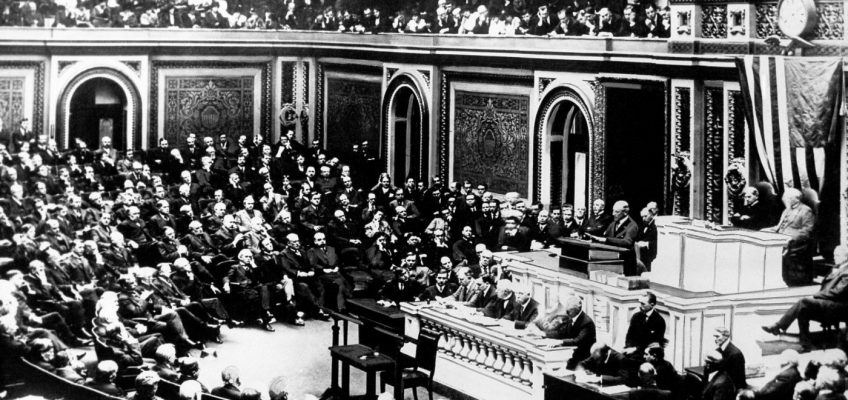April Fools’ Day is a holiday that could really use a signature dish. Chef and author Rozanne Gold once wrote an article arguing for “culinary pranksterism” for April Fools’; she’d long collected surprising but wonderful recipes, like a chicken roasted inside a watermelon and cake baked in a shoe box (women’s size 9, 24 servings). A more literal but still delicious option: the fool, a heavenly English dessert that consists of mashed fruit and lightly sweetened whipped cream.
Not a prank, and not a drill: garlicky Alfredo beans, featured below, can turn a can or two of white beans into a really good dinner.
Garlicky Alfredo Beans
Garlicky alfredo beans. Food styled by Spencer Richards. (Kerri Brewer / The New York Times)
This five-ingredient recipe transforms canned beans into a no-fuss, comforting meal that’s easy to whip together at the end of a long day. The beans are doused in a creamy, garlic-infused sauce that’s inspired by Alfredo, and topped with crunchy garlic chips. Choosing the right beans for this recipe might feel intimidating, but the most important thing to remember is texture. Beans that hold their shape and won’t immediately disappear in the sauce are ideal: butter (or lima), Great Northern or chickpeas will make great contenders for this recipe. When pan-frying the sliced garlic into chips, you’ll want to mix attentively for the best results, since the delicate garlic chips can burn very easily. Crunchy and flavorful, they’re worth the effort.
By Carolina Gelen
Yield: 4 servings
Total time: 20 minutes
INGREDIENTS:
1/4 cup unsalted butter
8 garlic cloves, thinly sliced, plus 1 garlic clove, finely grated
Kosher salt
2 (15-ounce) cans white beans, rinsed
3/4 cup heavy cream
1/2 cup/2 ounces finely grated Parmesan, plus more for serving
PREPARATION:
1. Line a small plate with a paper towel.
2. In a medium pot over medium heat, combine the butter and sliced garlic. Cook, stirring frequently, for about 2 minutes. Once the butter starts to foam, start lifting the garlic to check its color and continue cooking and stirring until it starts to turn golden, another minute. (The garlic can burn very easily — and can continue to darken and cook after it’s been removed from the heat — so make sure to keep an eye on the pot and remove the garlic before it reaches a dark golden color.)
3. Using a slotted spoon, transfer the garlic chips to the paper towel-lined plate and season with salt.
4. Add the beans, heavy cream, Parmesan and a hefty pinch of salt to the pot; stir to combine.
5. Bring the mixture to a simmer over medium-high heat and cook, stirring gently but frequently, for about 5 minutes, until the sauce has thickened.
6. Stir in the grated garlic and continue simmering for 2 minutes, until fragrant.
7. Divide among bowls. Top with additional Parmesan and the garlic chips.
Chicken Jalfrezi
Chicken Jalfrezi. Food Stylist: Simon Andrews. (Christopher Testani / The New York Times)
Originally created as a way to add flavor to roasted meats, chicken jalfrezi is a tangy, spicy stir-fried curry with origins in Bengal. “Jalfrezi” translates to “hot fry,” and the dish typically features meat coated in a thick tomato-based gravy — a defining characteristic of the Anglo-Indian version that became popular through British curry houses in the mid-20th century. This recipe uses both Kashmiri chile powder and fresh serrano chiles to deliver its signature spicy kick.
By Zaynab Issa
Yield: 4 servings
Total time: 45 minutes
INGREDIENTS:
3 tablespoons vegetable oil
2 red or yellow bell peppers (or a combination), cut into 1-inch chunks
2 large yellow onions, 1 onion cut into 1-inch chunks and 1 onion finely diced
Kosher salt, preferably Diamond Crystal
6 garlic cloves, finely grated
1 (2-inch) piece ginger, peeled and finely grated
1 serrano chile, thinly sliced, plus more if desired for serving
2 teaspoons ground cumin
2 teaspoons ground coriander
1 teaspoon garam masala
1 teaspoon Kashmiri chile powder (see tip)
1/2 teaspoon ground turmeric
1 (14-ounce) can crushed tomatoes (see tip)
2 pounds boneless, skinless chicken thighs, cut into 2-inch pieces
1 teaspoon sugar
1 to 2 teaspoons rice vinegar or white vinegar
Basmati rice or naan (homemade or storebought), for serving
PREPARATION:
1. Heat a large high-sided skillet over high. Add 1 tablespoon oil and swirl to coat the bottom of the pan. Add the bell pepper and onion chunks. Cook, stirring once halfway through the cook, until crisp-tender and charred in spots, about 5 minutes. Transfer to a plate.
2. Reduce heat to medium and add the remaining 2 tablespoons oil, the finely diced onion, and 2 teaspoons salt. Cook, stirring often and scraping up any browned bits, until onion is softened and beginning to brown, 5 to 7 minutes.
3. Add garlic, ginger, serrano, cumin, coriander, garam masala, chile powder and turmeric and stir constantly to toast the spices until fragrant, about 30 seconds. Add crushed tomatoes and 1 teaspoon of salt and stir to combine. Cook until deepened in color and beginning to stick to the bottom of the pan, 6 to 8 minutes.
4. Add chicken and 1 cup water and stir to combine. Increase heat to medium-high and cook, stirring occasionally, until the chicken has cooked through and the gravy has thickened, about 12 minutes.
5. Stir in reserved bell pepper and onion chunks, sugar and vinegar to taste. Cook until warmed through, about 1 minute. Serve with basmati rice or naan, topped with more serrano chile if desired.
TIPS:
To substitute Kashmiri chile powder, use 1/2 teaspoon paprika and 1/4 to 1/2 teaspoon ground cayenne, depending on your heat tolerance.
To substitute crushed tomatoes, use 1 pound of diced plum tomatoes (5 or 6 medium) and 2 tablespoons tomato paste, adding the tomato paste with the spices.
Salmon With Anchovy-Garlic Butter
Salmon With Anchovy-Garlic Butter. Food Stylist: Spencer Richards. (Christopher Testani / The New York Times)
Minced anchovies and garlic add a complex salinity to seared salmon, enriching and deepening its flavor. To get the most out of them, the anchovies and garlic are mashed into softened butter, which is used in two ways: as a cooking medium and as a sauce. Used to cook the salmon, the butter browns and the anchovies and garlic caramelize, turning sweet. When stirred into the pan sauce, the raw garlic and anchovies give an intense bite that’s mitigated by the creaminess of the butter. It’s a quickly made, weeknight-friendly dish that’s far more nuanced than the usual seared salmon — but no harder to prepare.
By Melissa Clark
Yield: 4 servings
Total time: 25 minutes
INGREDIENTS:
3 tablespoons unsalted butter, softened
4 anchovy fillets, minced
1 fat garlic clove, minced (or 2 small ones)
1/2 teaspoon coarse kosher salt
Freshly ground black pepper
4 (6- to 8-ounce) skin-on salmon fillets
2 tablespoons drained capers, patted dry
1/2 lemon
Fresh chopped parsley, for serving
PREPARATION:
1. Heat oven to 400 degrees. In a small bowl, mash together butter, anchovies, garlic, salt and pepper.
2. In a large ovenproof skillet, melt about half the anchovy butter. Add fish, skin side down. Cook for 3 minutes over high heat to brown the skin, spooning some pan drippings over the top of the fish as it cooks. Add capers to bottom of pan and transfer to oven. Roast until fish is just cooked through, 8 to 10 minutes.
3. Remove pan from oven and add remaining anchovy butter to pan to melt. Place salmon on plates and spoon buttery pan sauce over the top. Squeeze the lemon half over the salmon and garnish with chopped parsley. Serve.
Sheet-Pan Sausages, Sweet Potatoes and Balsamic Kale
Sheet-Pan Sausages, Sweet Potatoes and Balsamic Kale. Food Stylist: Rebecca Jurkevich. (Emma Fishman / The New York Times)
This cozy sheet-pan dinner has flavors we love to love all year long. As sausage, sweet potatoes and whole sage leaves roast together, the sage seasons the sweet potatoes and crisps as if you fried them. Meanwhile, kale leaves soften in a combination of balsamic vinegar, dried cranberries (or cherries), honey and shallot. When the sausages and sweet potatoes are browned, transfer them to plates, then use the pan drippings and residual heat on the sheet pan to turn the kale silky and tangy.
By Ali Slagle
Yield: 4 servings
Total time: 45 minutes
INGREDIENTS:
1 pound hot or sweet Italian sausages
2 medium sweet potatoes (about 1 1/2 pounds), cut into 1-inch pieces
1/4 cup sage leaves
4 tablespoons extra-virgin olive oil
Salt and black pepper
1/4 cup dried cranberries or cherries
1 shallot, thinly sliced
2 tablespoons balsamic vinegar
1 1/2 teaspoons honey
1 bunch kale
PREPARATION:
1. Heat the oven to 425 degrees. Score the sausages in a few places. Toss the sausages, sweet potatoes and sage on a sheet pan with 3 tablespoons olive oil, salt and pepper until well coated. Spread in an even layer and roast until golden brown and cooked through, 25 to 30 minutes.
2. Meanwhile, in a large bowl, stir together the cranberries, shallot, vinegar, honey and remaining tablespoon oil. Strip the kale leaves of their stems, then rip the leaves into bite-size pieces and add to the bowl. Sprinkle with salt and pepper and toss until coated and slightly wilted.
3. Transfer the cooked sausages and sweet potatoes to plates. Add the kale and balsamic mixture to the sheet pan and toss until the kale is warm. Serve with the sausages and sweet potatoes.
Extra-Green Pasta Salad
Extra-Green Pasta Salad. Food styled by Samantha Seneviratne. (Johnny Miller / The New York Times)
This vibrant green pasta salad gets its color from a combination of spinach and basil, but you can swap the spinach for arugula for a more peppery finish. (Some of us need a little bite in our lives!). The miso in the sauce does a lot of the heavy lifting, imparting a salty, almost Parmesan-like quality. You can eat the salad immediately or chilled for a summer picnic. If making it a day ahead, don’t add the basil garnish and cheese until you’re ready to serve.
By Andy Baraghani
Yield: 4 to 6 servings
Total time: 30 minutes
INGREDIENTS:
Salt and pepper
1 pound short-cut pasta (such as rigatoni, campanelle or fusilli)
3 cups/8 ounces sugar snap peas
1 cup frozen English peas
3 packed cups/3 1/2 ounces baby spinach
2 packed cups/1 1/2 ounces basil leaves, plus more for serving
1/2 cup extra-virgin olive oil
2 tablespoons white miso
1 garlic clove, crushed
Zest and juice from 1 lemon
4 ounces Parmesan (or other firm salty cheese, such as feta or aged Gouda), thinly sliced
PREPARATION:
1. Bring a large pot of water to a boil, then throw in a handful of salt. Add the pasta, give it a stir and cook until al dente. Just before draining, add the snap peas and English peas to the boiling water to barely soften, 20 to 30 seconds. Drain the pasta and peas, and rinse lightly with cold water; set aside.
2. While the pasta water comes to a boil, place the spinach, basil, oil, miso, garlic, and lemon zest and juice in a blender. Blend to a bright green purée. Taste and adjust seasoning with salt and a few grinds of pepper, then blend again.
3. Transfer the purée to a large bowl that is big enough to toss all the pasta. Add the pasta and peas, and toss until coated. Season to taste with salt and pepper. Add the Parmesan and more basil leaves. Toss once more before serving.
Cooking with kids teaches healthy eating, life skills and more
Recipe: Pork chop crusty rolls conjure delicious memories of Hong Kong
These streamlined Neapolitan meatballs are made with panko breadcrumbs
Cheesy homemade manicotti is the star of this budget dinner for four
Recipes: Eggs too expensive? Here’s how to bake without them




